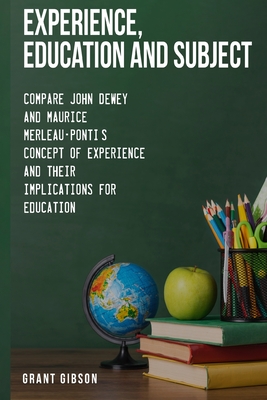Experience, Education and Subject

Experience, Education and Subject
John Dewey, the great American pragmatist, and Maurice Merleau-Ponty, who Paul Ricoeur described as "the greatest of the French phenomenologists," share remarkably similar views of experience and approaches to philosophy despite emerging from different traditions.1 These similarities appear even more striking when we recognize how little dialogue these two traditions had with each other. In their philosophies, both Dewey and Merleau-Ponty were attempting to articulate a more faithful account of experience than what had preceded them, and thus were responding to the artificial descriptions of experience given by British empiricists. Dewey and Merleau-Ponty were both dialectical thinkers who were greatly indebted to Hegel (particularly Dewey), though both drifted away from absolute idealism and began to root their philosophies in lived experience. They were both critical of Cartesian dualism, in all its lingering forms in modern philosophy, and sought to redefine the relationship between subject and world. Furthermore, both shared affinities with each other's traditions, with Dewey's approach to understanding experience verging on phenomenology, while Merleau-Ponty's descriptions of our prereflective understanding and engagement with the world resembled elements of pragmatism.
PRP: 464.94 Lei
Acesta este Prețul Recomandat de Producător. Prețul de vânzare al produsului este afișat mai jos.
418.45Lei
418.45Lei
464.94 LeiIndisponibil
Descrierea produsului
John Dewey, the great American pragmatist, and Maurice Merleau-Ponty, who Paul Ricoeur described as "the greatest of the French phenomenologists," share remarkably similar views of experience and approaches to philosophy despite emerging from different traditions.1 These similarities appear even more striking when we recognize how little dialogue these two traditions had with each other. In their philosophies, both Dewey and Merleau-Ponty were attempting to articulate a more faithful account of experience than what had preceded them, and thus were responding to the artificial descriptions of experience given by British empiricists. Dewey and Merleau-Ponty were both dialectical thinkers who were greatly indebted to Hegel (particularly Dewey), though both drifted away from absolute idealism and began to root their philosophies in lived experience. They were both critical of Cartesian dualism, in all its lingering forms in modern philosophy, and sought to redefine the relationship between subject and world. Furthermore, both shared affinities with each other's traditions, with Dewey's approach to understanding experience verging on phenomenology, while Merleau-Ponty's descriptions of our prereflective understanding and engagement with the world resembled elements of pragmatism.
Detaliile produsului













